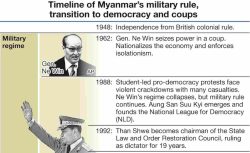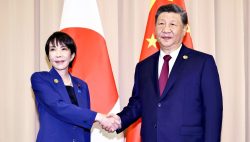17:00 JST, October 12, 2024
Amid an unprecedented increase in the nuclear threat posed by Russia’s aggression against Ukraine, efforts to continue to call for the abolition of nuclear weapons and to create momentum for disarmament have been highly evaluated.
The persistent, long-standing activities have had a great impact on the world. Such efforts deserve to be greatly honored.
It was decided that the 2024 Nobel Peace Prize will be awarded to Nihon Hidankyo, or the Japan Confederation of A- and H-Bomb Sufferers Organizations, an organization representing groups for such survivors nationwide in Japan.
As the reason for the award, the Norwegian Nobel Committee explained that through Hidankyo’s tireless efforts, an international norm developed, stigmatizing the use of nuclear weapons as morally unacceptable.
Next year will mark the milestones of the 80th anniversaries of the atomic bombings of Hiroshima and Nagasaki. The survivors are aging, and the number of people who can tell of their atomic bomb experiences in their own voices is decreasing. The growing importance of activities to convey the reality of the atomic bombings to the world and leave memories for future generations may also have contributed to the awarding of the prize to Hidankyo.
The incident in which the Japanese fishing boat Daigo Fukuryu Maru was exposed to radiation from a U.S. hydrogen bomb test at Bikini Atoll in the Pacific Ocean in 1954 became a catalyst for Hidankyo to come into being. Two years later, Hidankyo was launched mainly by atomic bomb survivors in Hiroshima and Nagasaki.
Since then, the organization has continued to collect signatures and make petitions in Japan and abroad under the slogan of “No More Hibakusha.” These activities bore fruit and the law concerning the relief to atomic bomb survivors was enacted in 1995.
Hidankyo attracted particular international attention when Barack Obama visited Hiroshima in 2016 as the first sitting U.S. president to do so.
The scene in which Obama shook hands with then Hidankyo Cochairperson Sunao Tsuboi was broadcast to the world as a symbol of reconciliation between the United States, which dropped the atomic bomb, and the atomic bomb survivors. Tsuboi passed away in 2021.
However, the situation regarding nuclear weapons has rather worsened. In addition to threats by Russia to use nuclear weapons, China is increasing its nuclear warheads. North Korea’s nuclear and missile development programs also threaten security in Asia.
Russia, in particular, has hinted at the possibility of using nuclear weapons, and Israel has not abandoned the possibility of attacking Iran’s nuclear facilities. There is a growing tendency to use the fear of nuclear weapons as a means to gain an advantage in war situations.
The committee may also have put into the decision to award the prize to Hidankyo its intention to issue a serious warning against these developments.
It can be said that Japan has taken on the responsibility to be more active than ever before in its efforts toward nuclear abolition.
In particular, Japan is in the position of having experienced the extent to which the use of nuclear weapons can inflict atrocious damage on humanity. Japan should take the lead in shaping international public opinion to stem the tide that seems to condone the use of nuclear weapons.
(From The Yomiuri Shimbun, Oct. 12, 2024)
Top Articles in Editorial & Columns
-

Myanmar Will Continue Under Military Rule Even After Election, Ex-Ambassador Maruyama Says in Exclusive Interview
-

40 Million Foreign Visitors to Japan: Urgent Measures Should Be Implemented to Tackle Overtourism
-

Expansion of New NISA: Devise Ways to Build up Household Assets
-

China Criticizes Sanae Takaichi, but China Itself Is to Blame for Worsening Relations with Japan
-

Withdrawal from International Organizations: U.S. Makes High-handed Move that Undermines Multilateral Cooperation
JN ACCESS RANKING
-

Univ. in Japan, Tokyo-Based Startup to Develop Satellite for Disaster Prevention Measures, Bears
-

JAL, ANA Cancel Flights During 3-day Holiday Weekend due to Blizzard
-

China Confirmed to Be Operating Drilling Vessel Near Japan-China Median Line
-

China Eyes Rare Earth Foothold in Malaysia to Maintain Dominance, Counter Japan, U.S.
-

Japan Institute to Use Domestic Commercial Optical Lattice Clock to Set Japan Standard Time



















